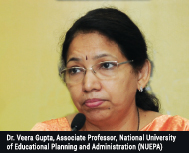Professional Public Educational Policy Making in India
 Professional Educational Public Policy making in India is at nascent stage. The three words "professional", "Public", and "Policy" are explained in this article in reference to educational sector in India. Professional is that activity which is conducted as per some agreed benchmarks against which it can be measured. Public denotes some issue which relates to masses and not are the propriety. Policy is vision, rules, regulations, law, grants, and incentives of the government for its citizens. Policy making activity should be viewed as dependent on the philosophy of governance of a country.
Professional Educational Public Policy making in India is at nascent stage. The three words "professional", "Public", and "Policy" are explained in this article in reference to educational sector in India. Professional is that activity which is conducted as per some agreed benchmarks against which it can be measured. Public denotes some issue which relates to masses and not are the propriety. Policy is vision, rules, regulations, law, grants, and incentives of the government for its citizens. Policy making activity should be viewed as dependent on the philosophy of governance of a country.
The governance philosophy be it monarchy or democracy has direct bearing on practices of policy making. If there is monarchy system as governance pattern, pronouncement of the monarch may become policy. However, it is not the case in the democracy. The democratic philosophy has a system of institutions weaved in such a manner that each one performs its duty individually but is still connected to bigger system. It can draw parallel to solar system. For example, there are twenty five regulatory bodies in India in education sector. Besides that, there are number of government bodies which influence policy of an educational institution. There is a different body for funding, another body for recruitment of teachers, yet another for admission, text books, evaluation and so on. To create synergy in all the elements as well as in the responsible bodies is the desired goal of democratic system. It involves transparency and participation of all the stake holders. To create truly democratic way of policy making is an arduous task. It is more so due to legacy of feudal mindset. The Organization of Economic and Cooperation and Development (OECD) is working towards to increase the understanding of policy making in a democratic country.
The OECD has recommended "policy" on policy making. Many countries have adopted it as well. It includes a checklist to be used by the policy makers or regulatory bodies to ensure that all steps have been taken while formulating a particular policy, law or regulation. The OECD has brought some salient features of policy making. These include but are not limited to the following two features namely Evidence based policy making and Stake holder consultations.
Evidence based policy making means that it is not the wishful thinking of few. Policy making should move away from the recommendations of the committee members. At present all the policy pronouncements are based on the recommendations of the committee or commission. The pronouncements are the expert opinions of the members based on their professional life experiences. These experiences of few preserve members are not the experiences of the whole population which is the beneficiary of the policy statement. There are enumerable policy pronouncements of such kinds. If any regulation is opposed by the user of that regulation, it is an evidence of the fact that evidences were not used while making that policy. Evidence is such a bit of piece of information which cannot be refuted by any one. It means same to all. If any recommendation made by the committee is suitably substantiated by data and facts, there are good chances that it will also be well received by the users as it clarifies their myths and doubts. The report of the Knowledge Commission is one such example of not using data or research findings while making recommendations for policy. The other good example of using research findings for recommendation is of Sachar committee report.
The other main feature of professional policy making is that all stake holders should be involved at various stages of policy making. A policy making cycle consists of five major stages. These are agenda setting, evidence collection for choosing a policy option, selecting policy choices, implementation, and finally evaluation. The stakeholders mean all the beneficiaries and functionaries related to that policy. For example, for teacher education policy, all teachers, university college management and educational planners and administrators are the stake holders. It is noticed that policy making body involves a few experts while formulating any regulations. There is no involvement of students, teachers and management at the time of formulation. The argument proposed for such a practice is that it is not possible to involve all the stake holders at all the five stages. The new knowledge on policy making literature teaches the strategies to identify all types of stake holders for a particular policy. There are many strategies to involve all stakeholders' at all five stages of policy making. Information technology has made it all the more easily to do so.
In India, no policy goes without resistance from the users. The situation can be altered very easily with the help of professional policy making practices. A well formulated policy can only be implemented. A well implemented policy only can yield desired results and bring changes in the society.
Dr. Veera Gupta
Dr. Gupta is a policy planner, implementer, researcher and professor of educational policy. She has worked in academic, research and regulatory bodies. She has experience of working with national, international and bi-national organizations on variety of assignments. Her areas of interest are Policy planning and implementation in the areas of teacher education, vocational education, special education and guidance and counseling. She has many publications to her credit.

.jpg)